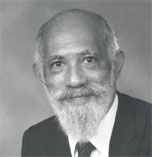

Sir Roy Augier, who passed away on Sunday January 26, 2025, at the age of 100, was a visionary academic, educator and administrator who played a key role in the establishment of Caribbean History as a study in its own right.
Born in St Lucia on December 17, 1924, Fitzroy Richard Augier attended the Roman Catholic Boys’ School and St Mary’s College in Castries, before leaving to serve in the Royal Air Force between 1942 and 1946. After demobilization, he entered the University of St Andrews, Scotland, graduating with an MA in History and Politics in 1949. He completed a Diploma in Education at the Institute of Education, University of London, the following year, before spending the next four years doing research at the University of London’s Institute of Historical Research and Institute of Commonwealth Studies. The work done there led to the preparation of a thesis for which he was awarded a PhD from St Andrews in 1954.
Augier returned to the Caribbean in 1954 to take up the post of Junior Research Fellow at the Institute of Social and Economic Studies, University College of the West Indies. The following year he was appointed Lecturer in the Department of History, where along with Elsa Goveia and Douglas Hall, he set about Caribbeanizing the teaching of West Indian History – emphasizing research and publications that helped to dismantle imperial preconceptions.
His early teaching duties in Department of History included undergraduate courses in European History, the History of the West Indies, and the History of Political Thought, a course that in one form or another he would teach for nearly four decades – surely a record for the UWI. He was described as a teacher who gave unstintingly to his students and whose actual hours of teaching and tutorial work far exceeded what the time-table required of him. In addition to teaching, Augier also began supervising postgraduate students who would form the next generation of West Indian historians such as Carl Campbell.
Research was an important part of his work, his main field being political and constitutional history: what started with an interest in Crown Colony Government in Jamaica developed more widely into an interest in the nature of wider Crown Colony government, and the way it served as an instrument of metropolitan control. By the mid-1960s, Augier was recognised as an authority on the subject in the Caribbean as well as at British universities. This growing reputation helped him to gain promotion to the rank of Senior Lecturer in 1965.
Described as having a predilection for teaching rather than publication, Augier over his academic career was nonetheless involved in the publication of a number of landmark texts. He, Shirley Gordon, Douglas Hall and M Reckord co-authored The Making of the West Indies (1960), which for the next two decades underpinned the teaching of West Indian History in secondary schools. Along with MG Smith and Rex Nettleford, he conducted research on Rastafari and produced the report on the “The Rastafarian Movement in Kingston, Jamaica, 1960”. Later on, he served as chairman of the drafting committee for UNESCO’s General History of the Caribbean.
In 1989, shortly before his oeicial retirement from the UWI, he was appointed Professor under the Ordinance that allows stae to be made a ‘professor by acclaim’ – the first time that this clause of the Ordinance had been used. After retirement, Augier continued to teach on a temporary basis in the department, mentor students, and was a fixture at weekly Department seminars. He was respected by colleagues, and remembered for his invaluable contribution to the morale and comradeship in the Department.
In addition to his service to the Department of History, Augier was also heavily involved in the senior management of the University, having served on the Senate, the Council, Planning and Estimates Committee, as Chairman of Academic Board (Mona), Chairman of the Board for Higher Degrees, and Chairman of the Research and Publications Committee. In 1967, he was elected Dean of the Faculty of General Studies, and in 1972 appointed a Pro-Vice-Chancellor of the University. In January 2020, Augier was awarded the University Chancellor’s Medal – the University’s highest honour.
Augier contributed in many other ways to the development of the discipline of West Indian History, none more significant than in his work to push the teaching of West Indian History in secondary schools. In the 1960s, he helped to review the Cambridge Ordinary and Advanced Level Caribbean History syllabuses and later, as chair of the History panel at the Caribbean Examinations Council (CXC), helped in the development
of the region’s own history syllabuses and examination system. He was tireless in helping to prepare teachers in the secondary schools, conducting courses for history teachers in Jamaica, Barbados and Trinidad. He later served as Chairman of the CXC from 1986-1996, during which time he helped to spearhead introduction of the Caribbean Advanced Proficiency Examinations (CAPE).
For more than six decades, Augier relentlessly encouraged the study of West Indian History and the institutions that support it – at the departmental, regional and international levels; he mentored, motivated and counselled his students and fellow academics; and he was committed to the project of teaching Caribbean people about their own history as he saw it as fundamental for Caribbean development. In 1996, he was Knighted for his contribution to education. He leaves behind an immeasurable legacy.